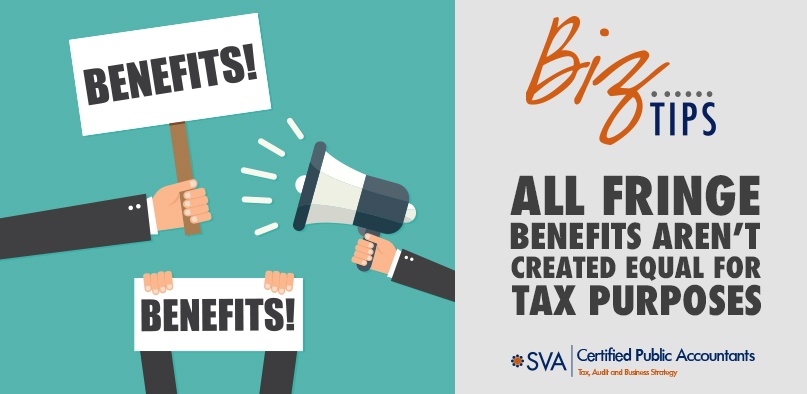According to IRS Publication 5137, Fringe Benefit Guide, a fringe benefit is “a form of pay (including property, services, cash or cash equivalent), in addition to stated pay, for the performance of services.”
But the tax treatment of a fringe benefit can vary dramatically based on the type of benefit.
IRS Tax Approaches to Fringe Benefits
Generally, the IRS takes one of four tax approaches to fringe benefits:
1. Taxable/Includable
The value of benefits in this category are taxable because they must be included in employees’ gross income as wages and reported on Form W-2. They’re usually also subject to federal income tax withholding, Social Security tax (unless the employee has already reached the current year Social Security wage base limit) and Medicare tax. Typical examples include cash bonuses and the personal use of a company vehicle.
2. Nontaxable/Excludable
Benefits in this category are considered nontaxable because you may exclude them from employees’ wages under a specific section of the Internal Revenue Code. Examples include:
- Working-condition fringe benefits, which are expenses that, if employees had paid for the item themselves, could have been deducted on their personal tax returns (such as subscriptions to business periodicals or websites and some types of on-the-job training),
- De minimis fringe benefits, which include any employer-provided property or service that has a value so small that accounting for it is “unreasonable or administratively impracticable” (such as occasional coffee, doughnuts or soft drinks and permission to make occasional local telephone calls),
- Properly documented work-related travel expenses (such as transportation and lodging),
- Up to $50,000 in group term-life insurance, as long as the policy meets certain IRS requirements, and
- Employer-paid health care premiums under a qualifying plan.
3. Partially Taxable
In some cases, the value of a fringe benefit will be excluded under an IRC section up to a certain dollar limit with the remainder taxable. A public transportation subsidy under Section 132 is one example.
4. Tax-Deferred
This designation applies to fringe benefits that aren’t taxable when received but that will be subject to tax later. A common example is employer contributions to a defined contribution plan, such as a 401(k) plan.
Are you applying the proper tax treatment to each fringe benefit you provide? If not, you could face unexpected tax liabilities or other undesirable consequences.
Please contact us with any questions you have about the proper tax treatment of a particular benefit you currently offer or are considering offering.

© 2017

